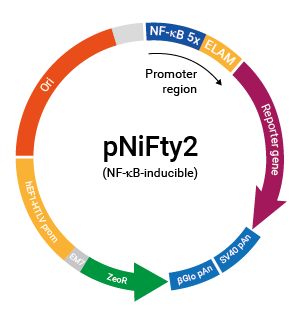pNiFty2 - NF-κB reporter plasmids (Zeocin® resistance)
| Product | Unit size | Cat. code | Docs. | Qty. | Price | |
|---|---|---|---|---|---|---|
|
pNiFty2-N-SEAP-Zeo NF-κB-inducible SEAP reporter plasmid with Zeocin® resistance gene |
Show product |
20 µg |
pnf2-sp1
|
|
||
|
pNiFty2-N-Lucia-Zeo NF-κB-inducible Lucia luciferase reporter plasmid with Zeocin® resistance gene |
Show product |
20 µg |
pnf2-lc
|
|
||
|
pNiFty2-N-Fluc-Zeo NF-κB-inducible Firefly luciferase reporter plasmid with Zeocin® resistance gene |
Show product |
20 µg |
pnf2-fluc
|
|
||
|
pNiFty2-N-Rluc-Zeo NF-κB-inducible Renilla luciferase reporter plasmid with Zeocin® resistance gene |
Show product |
20 µg |
pnf2-rluc
|
|

NF-κB-inducible pNiFty2 plasmid
NF-κB-inducible reporter plasmids - ELAM promoter - Zeocin® resistance
InvivoGen has designed pNiFty2, a collection of inducible reporter plasmids, to monitor pattern recognition receptor (PRR) activation and cytokine signaling through the inducible expression of reporter genes.
The pNiFty2-N plasmids feature an NF-κB-inducible reporter gene under the control of an engineered ELAM (endothelial cell-leukocyte adhesion molecule) promoter. This promoter comprises five NF-κB repeated transcription factor binding sites (TFBS) to enhance NF-κB-mediated transcription [1].
The reporter genes encode either:
- SEAP (secreted alkaline phosphatase),
- Lucia luciferase (secreted),
- Firefly luciferase (intracellular), or
- Renilla luciferase (intracellular).
These four pNiFty2-N plasmids are selectable with Zeocin® in both E. coli and mammalian cells and can be used to generate stable clones. They are also available with either Blasticidin or Puromycin resistance, see table below:
| SEAP | Lucia | Firefly | Renilla | |
|---|---|---|---|---|
| Blasticidin |
pNiFty2-N-SEAP-Blasti # pnf2b-sp1 |
pNiFty2-N-Lucia-Blasti # pnf2b-lc |
pNiFty2-N-Fluc-Blasti # pnf2b-fluc |
pNiFty2-N-Rluc-Blasti # pnf2b-rluc |
| Puromycin |
pNiFty2-N-SEAP-Puro # pnf2p-sp1 |
pNiFty2-N-Lucia-Puro # pnf2p-lc |
pNiFty2-N-Fluc-Puro # pnf2p-fluc |
pNiFty2-N-Rluc-Puro # pnf2p-rluc |
► pNifTy2-N and pNiFty3-I families allow you to generate your own Dual reporter cell lines for the simultaneous monitoring of NF-κB and IRF activation, using the combination of reporter and antibiotic resistance genes that suits you best.
![]() Learn more about creating your own Dual reporter cell lines.
Learn more about creating your own Dual reporter cell lines.
For your convenience, InvivoGen also provides the reporter detection reagents QUANTI-Blue™, QUANTI-Luc™ 4 Gaussia/Lucia , and QUANTI-Luc™ 4 Renilla to measure SEAP, Lucia, and Renilla activities, respectively.
Reference:
1. Schindler U, Baichwal VR, 1994. Three NF-kappa B binding sites in the human E-selectin gene required for maximal tumor necrosis factor alpha-induced expression. Mol Cell Biol. ;14(9):5820-31.
Back to the topSpecifications
Minimal Promoter: NF-κB-5x ELAM is an engineered ELAM promoter combined with five NF-κB repeated transcription factor binding sites.
Reporter Gene: SEAP (secreted embryonic alkaline phosphatase), Lucia luciferase, Renilla luciferase, or Firefly luciferase
Selection: Zeocin®
Back to the topContents
- 20 µg of lyophilized DNA
- 1 ml of Zeocin® (100 mg/ml)
![]() Product is shipped at room temperature.
Product is shipped at room temperature.
Details
• SEAP is a secreted form of human embryonic alkaline phosphatase. It is extremely heat stable and resistant to the inhibitor L-homoarginine. It catalyzes the hydrolysis of pNitrophenyl phosphate (pNpp) producing a yellow end product. SEAP levels can be evaluated qualitatively with the naked eye and quantitatively using a spectrophotometer at 405 nm in combination with SEAP detection media, such as HEK-Blue™ Detection or QUANTI-Blue™ Solution, a SEAP detection reagent.
• Lucia is a secreted coelenterazine luciferase encoded by a synthetic gene developed by InvivoGen. It generates 1000-fold higher bioluminescent signal compared to the commonly used Firefly and Renilla luciferases. Lucia luciferase activity can be evaluated using QUANTI-Luc™ 4 Lucia/Gaussia, an assay reagent containing all the components required to quantitively measure the activity of Lucia luciferase and other coelenterazine-utilizing luciferases.
• The firefly luciferase (Fluc) gene encodes for an intracellular luciferase of fireflies and click beetles. This enzyme interacts with D-luciferin as a chemiluminescent substrate to produce light emission peaking at 560 nm. After cell lysis, the reaction can be measured and detected simply, rapidly, and with good sensitivity by means of a luminescence-measuring instrument.
• The Renilla luciferase (Rluc) gene encodes for an intracellular luciferase from the sea pansy renilla reniformis. This enzyme catalyzes coelenterazine oxidation leading to bioluminescence and the production of light emission peaking at 480 nm. After cell lysis, the activity can be evaluated using QUANTI-Luc™ 4 Renilla, an assay reagent containing all the components required to quantitively measure the activity of Renilla luciferase and other coelenterazine-utilizing luciferases.
Back to the top



